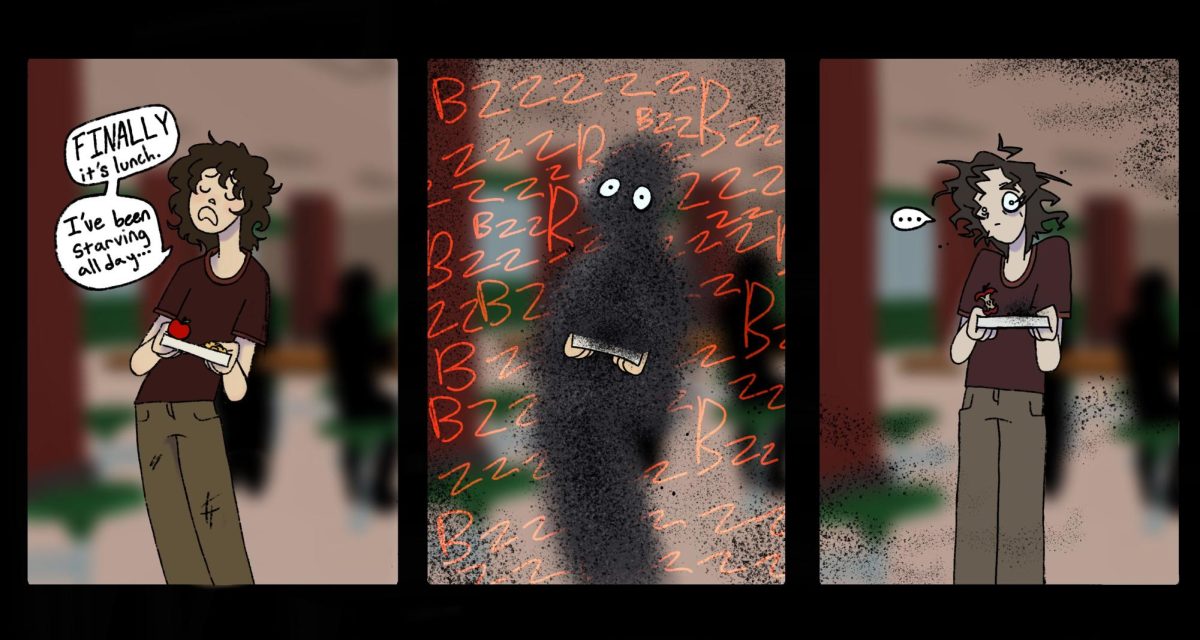Now, I know that just because of the title, someone out there is already outraged and getting ready to be argumentative no matter what I say. But this is something that desperately needs to be discussed.
There are so many articles and books out there by the older generations in which they bash Gen Z for just existing. Common issues addressed within these articles are Gen Z’s cell phone addictions, choosing solitude over social interactions, and the new slang terms that Gen Z makes up.
I have a very controversial opinion about Gen Z’s cell phone addiction—though this whole article may be controversial to many people. Maybe Gen Z is “addicted” to cell phones because the real world is absolutely horrific. When kids nowadays go to school, they have to deal with the fact that they might become a statistic of school shootings, a nightmare which has come true for many. The idea that even school isn’t safe is terrifying to many.
So maybe kids are addicted to cell phones. But maybe cell phones aren’t the issue—maybe society is the real issue. With all of the school shootings, wars such as Israel vs. Hamas and Ukraine vs. Russia, the past pandemic, and the judgment that Gen Zers know they will inevitably have to deal with once they leave their perfectly curated online world, can you really blame them? What is the desire to face the real horrific world when you could stay in a world where there may be criticism and awful things, but at the end of the day, it’s fake and sheltered from the devastation of the real world?
On a different note, older generations were the ones to create the technology they claim is ruining Gen Z. But if they created it then why would they not have made it less addictive? The truth is, this is one cell phone designers want. They want teens to become addicted to the devices—it’s obvious when you realize that, at the end, they are the only ones that profit. Yet this is just one other twisted part of society in today’s day and age that is usually ignored and pushed to the back burner.
Along with this, older generations often complain that Gen Z—or iGen, as Jean Twenge, author of the book of the same name, calls them—never go outside or have in-person conversations. My take on this? It’s hard to go outside and hang out with friends when you can’t drive, it’s not safe to walk many places, and your parents are either strict or just physically can’t bring you because of work or other responsibilities. So is it the kids liking technology more than people, or just the fact that nowadays parents have to work more and don’t feel safe with their kids going out in today’s world?
A common issue I have found in my daily life is that parents, teachers, and adults in general don’t typically understand Gen Z slang and oftentimes heavily criticize it. Yet, if we look back at all the generations, every single one created new slang terms that older generations didn’t understand either—especially since they were new and unfamiliar. Terms such as chill pill, dude, gnarly, yuppie, and crib are just some examples of Gen X slang. Though these terms are now frequently used and understood by many, at the time of their creation, they too were judged for not making any sense. The cycle continues today.
I referenced the book iGen by Jean Twenge on multiple occasions during this article. This is because iGen was my initial wake up call to these issues. I was first introduced to iGen when my AP Seminar teacher, Mr. Higgins, asked my class to read the book’s introduction for class. As I was reading, I realized just how appalling some of the things Twenge says about the generation are—the generation she claims she was the first to name iGen. She says things such as, “We all need to understand them, including friends and family looking out for them, businesses searching for new recruits, colleges and universities educating and guiding students, and marketers figuring out how to sell to them. Members of iGen also need to understand themselves as they explain to their elders and their slightly older peers how they approach the world and what makes them different.”
Now, at first glance, nothing about this section seems of much value. Yet if we look at the wording she uses, we can see some clear bias. The way she refers to iGen as “them” sounds almost like she is talking about a newly discovered species, not 20-year-olds and teenagers. This in and of itself gave me a sour taste in my mouth for the rest of this prologue. Not only does she blatantly demonstrate her annoyance, jealousy, and basically hatred of Gen Z, it is also implied. This implication is specifically shown when she discusses how she herself has two iGen daughters. Now I don’t know about you, but I know my parents judge the way I act because that’s kind of an unwritten part of the job description. So when I heard she was a parent to kids in the generation she was criticizing, immediately I saw red flags.
I’m not the only one who felt this way about this book. Just in my class alone, over 15 students had similar opinions about just the introduction. I even showed this text to my mother, a member of Gen X, who also agreed with me, saying that it was blatantly obvious that Twenge went into the book with a desired conclusion in mind.
If you want an example of an outsider’s opinion on this book, look into the article “Are Smartphones Destroying a Generation, or Are Consultants?” by Malcolm Harris, published by New York Magazine. Before reading this article, I still held some respect for Twenge because at the end of the day, some of her evidence did make sense, even if her actual relay of the message was flawed at best. In this article, Harris writes that “in iGen, [Twenge] writes off the importance of the 2007–09 recession because ‘[u]nemployment, one of the best indicators of how the economy is affecting real people, peaked in 2010 and then declined.’” This showed how Twenge went in with a conclusion, only used evidence that benefited her, and removed the evidence that proved her research and theory to be feeble.
This idea of judging the new generation is mundane and rudimentary at best. The thought that some big switch in generations’ behaviors, thoughts, and actions has occurred, as iGen describes, is a ginormous reach. Sure, teenagers nowadays don’t read dictionaries to look for things anymore, but neither do the majority of the population. In my opinion, there is no “generational switch,” there is just a cultural change. This culture change changed the way teeneagers behave now than they did when Gen X and Millennials were in school. I would go as far as to hypothesize that adults today act differently than people in the Boomer generation acted, and so on and so forth.
The internet affects everyone and everything in today’s society, so of course people are going to be changed. This is an obvious fact, and to attribute this to just being generational is absurd. I am willing to bet that if we look back in time after other large advancements in human society, we will again see the same trends as we do now. Teenagers will always act differently than previous teen generations have—this is fundamental. So can we, as a society, let go of this idea that our own generation is superior to the next generation as a whole just because of new slang? I honestly ask you, what is the point? Why are we repeating history by thinking the next generation is less than us? Because I assure you, if we continue the way we always have, nothing will ever change and we will be stuck in this cycle of judgment forever.














Joe • May 1, 2025 at 3:22 am
Well said. Your generation doesn’t have the privilege that is blissful ignorance, and it’s not y’all’s fault.
I was in HS 08-12 and we were just getting social media at the tail end of it. My first iPhone was in college. I wasn’t bothered by the… divisive noise of the doom scrolling algorithms that have taken over the internet. Now in my 30s it bothers me every day, the depressing daily new cycle makes it hard to be optimistic about the future.
Really love Jeans comment here too. I’m charmed to have found this article. Truly profound.
Jean Shubbar • Mar 19, 2025 at 2:26 am
I agree with you. Older generations created this society. They chose extreme political decision. They chose poor gun regulation. They chose to destroy the environment and they chose ti support wars. They stuck their heads in the sand and asked “why do they hate us” when 9/11 happened. Totally ignorant to what their own country was involved in around the world. They chose money over everything else. They created the technology that they are now afraid of. They allowed a pandemic run amok and also become politicized. They display antisocial behaviors and elected a president with anti-social behavior and then accuse Gen Z of not interacting enough. I’m a boomer and I’m disgusted with my generation and gen x. Our generations have completely abdicated responsibility for what we wrought – including creating a society where both parents must work, tiny infants are forced into daycares without individualized attention. Children were treated as an afterthought in this country as their parents ts chose climbing the corporate latter and tossing material things at them for compensation for lack of time and attention. They were treated like pets at best but often like inconveniences. The boomers created the latch key generation which then over compensated by being hyper accommodating to their own kids and so on and so forth. If they don’t like Gen Z then they need to go find mirrors to see who they need to blame.
Terry Bishop • Mar 4, 2025 at 10:31 pm
“What is the desire to face the real horrific world when you could stay in a world where there may be criticism and awful things, but at the end of the day, it’s fake and sheltered from the devastation of the real world?”
They should face it.
Kate Taylor • Oct 7, 2024 at 11:15 am
IGen was such a frustrating book!